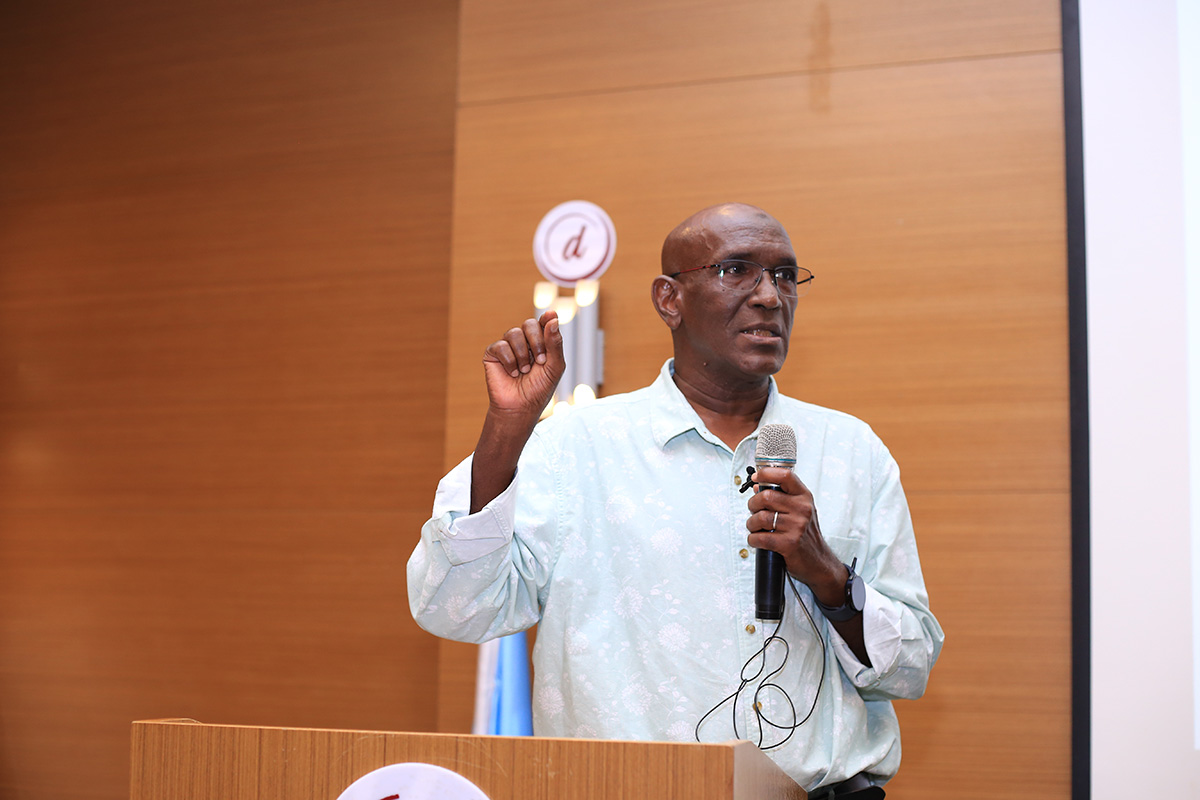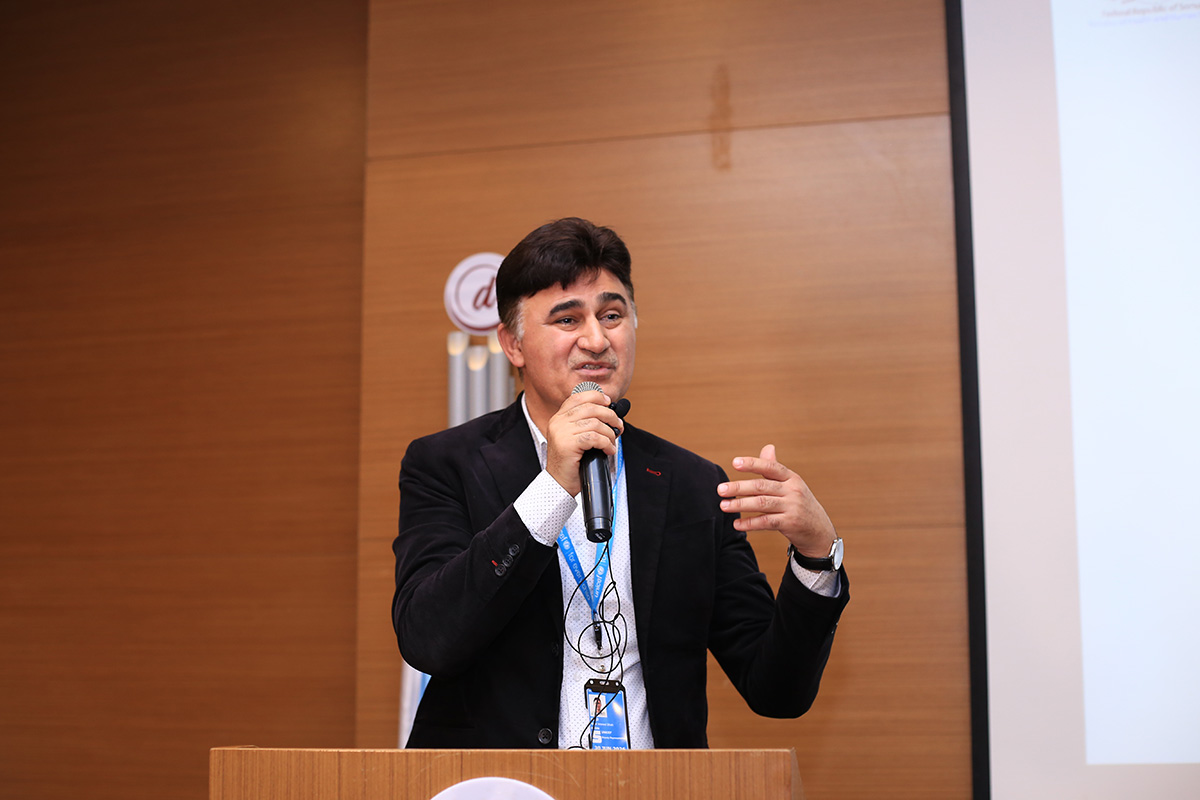Voices from the field: Hani Jilaow Mohamed, polio vaccinator in Mogadishu
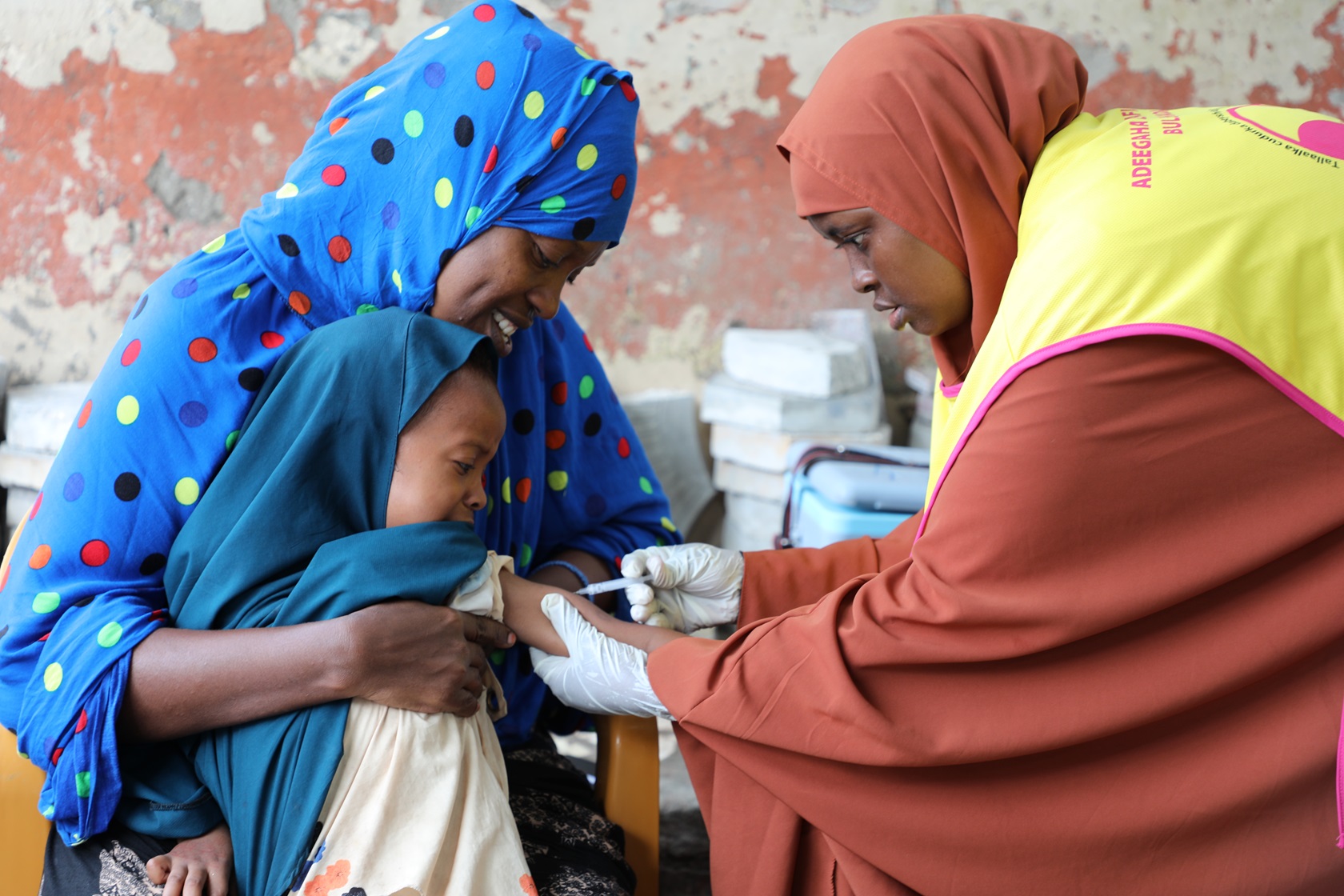
Hani’s blend of skill and courage has made her a pivotal figure in the ongoing fight against the disease.
The 36-year-old mother of 6 is one of thousands of health workers who vaccinate children against polio and other infectious diseases.
Before Hani embarked on a career in public health, she and her family were deeply affected by the civil war in Somalia when the long drawn out conflict tragically claimed her father's life. With the family deprived of its sole breadwinner, Hani was forced to drop out of elementary school. Later, though, she secured a place on a health training programme offered by the United Nations Children’s Fund (UNICEF).
After being trained on vaccination techniques in 2005, Hani was equipped with the skills needed to pursue a career administering vaccines to children and adults. "My goal was to learn a skill that could help me earn a living while assisting others. Since then, I have dedicated myself to this work," she says.
Overcoming challenges to immunization
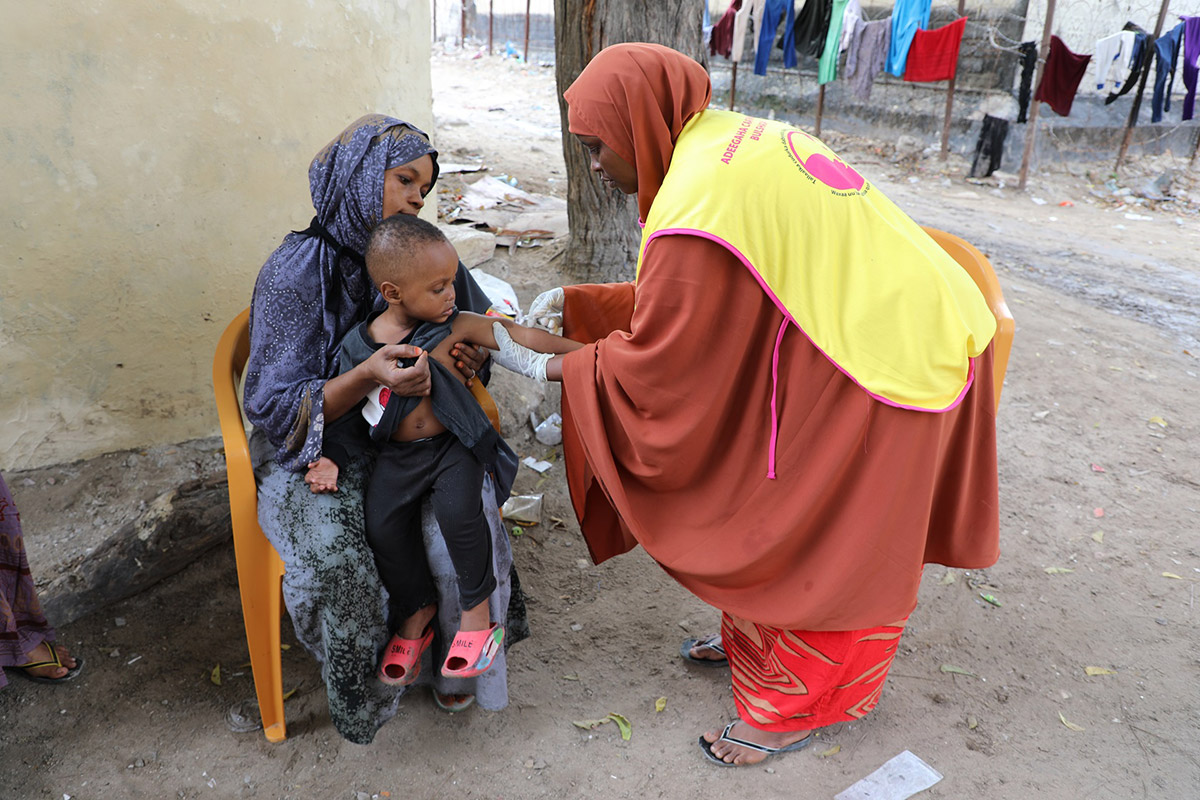
When Hani began working, the concept of vaccination was often misunderstood within the community. Undeterred, Hani and her team – including a supervisor, social mobilizer and recorder – persevered with their vital work.
“Initially, many people feared getting vaccinated. To build understanding, we worked with midwives, traditional leaders and religious figures to educate the community about the benefits of vaccination. Gradually, awareness levels grew, and acceptance of vaccines improved."
Currently, Hani and her team are working as part of the Big Catch-Up Initiative, a recovery plan initiated last year to close the immunization gaps that resulted from the COVID-19 pandemic.
At the Waberi Maternal and Child Health Centre (MCH) in Mogadishu, polio health workers assemble at 08:00 every day before embarking on door-to-door visits across the district.
"During vaccination campaigns, I leave my house in the morning, head to Waberi MCH and pick up my vaccine carrier and supplies and then vaccinate around 18 to 20 households each day,” says Hani, describing her daily routine which ends at 17:00.
Hani and her team say improved security and greater community acceptance of vaccines have made their work noticeably easier.
"Over the years, Somalia – formerly one of the most at-risk countries for polio – has made significant progress thanks to global efforts spearheaded by WHO. These initiatives have bolstered the fight against polio, and brought us close to the ultimate goal of eradicating the disease in Somalia."
Hani adds, however, that more work is needed to end the outbreak of variant poliovirus type 2 which began in 2017, and to strengthen routine immunization for children across the country.
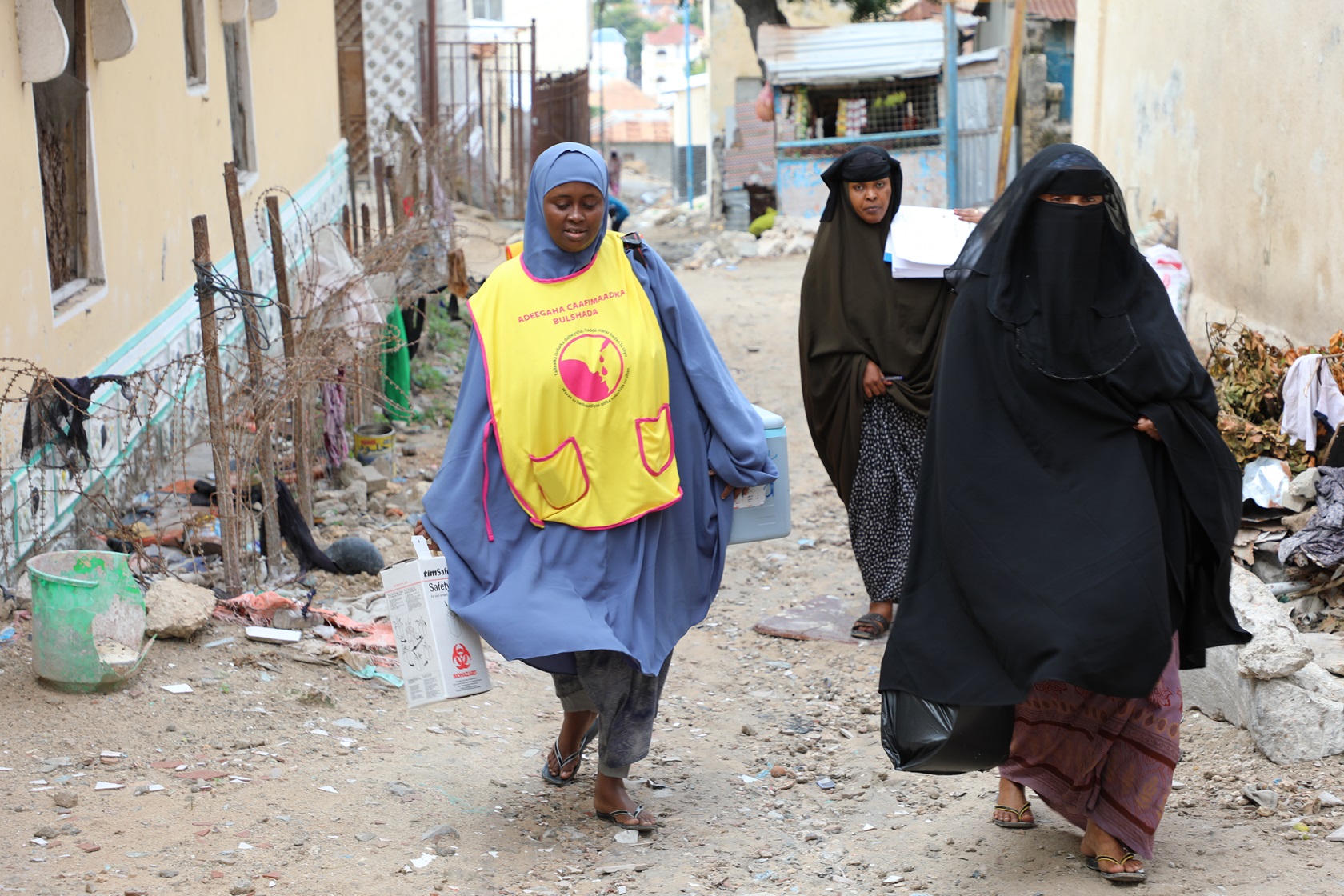
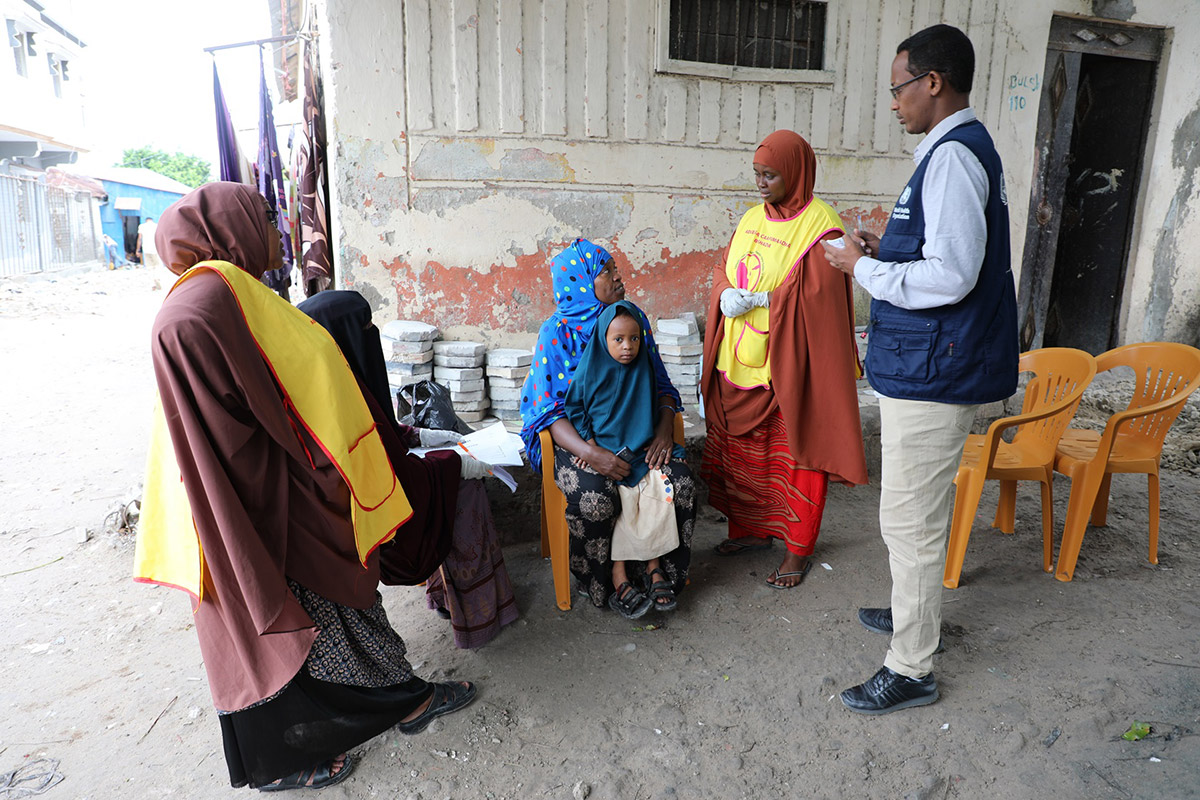
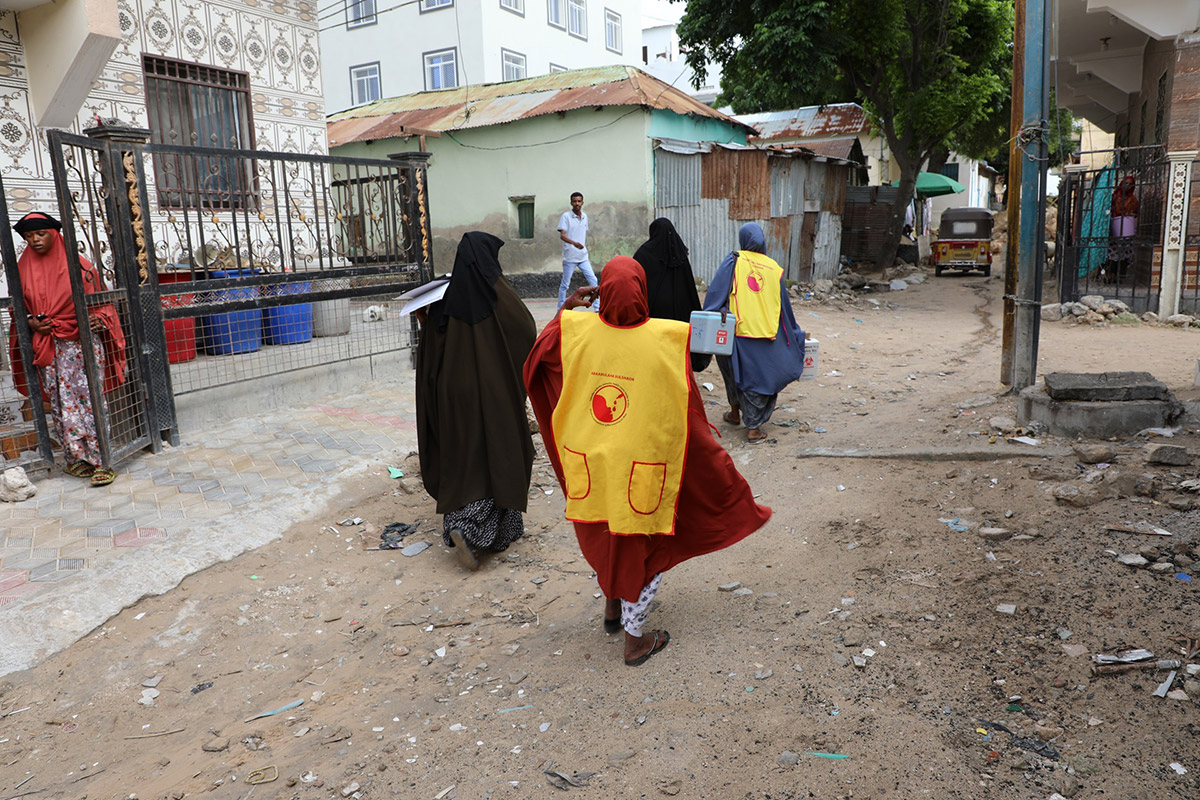
Somalia renews its commitment to end polio and ensure vaccination for every child
24 October 2024, Somalia – This World Polio Day, the Government of Somalia, the World Health Organization (WHO) and the United Nations Children’s Fund (UNICEF) join in reaffirming their commitment to safeguard every child against polio.
Since the launch of the Global Polio Eradication Initiative (GPEI) in 1988, the incidence of polio has plummeted by 99 per cent thanks to the widespread use of vaccines. Engagement by Somalia's Federal Ministry of Health, state leaders, communities, parents and caregivers, and the support of health care workers, has been vital to the success of vaccination campaigns.
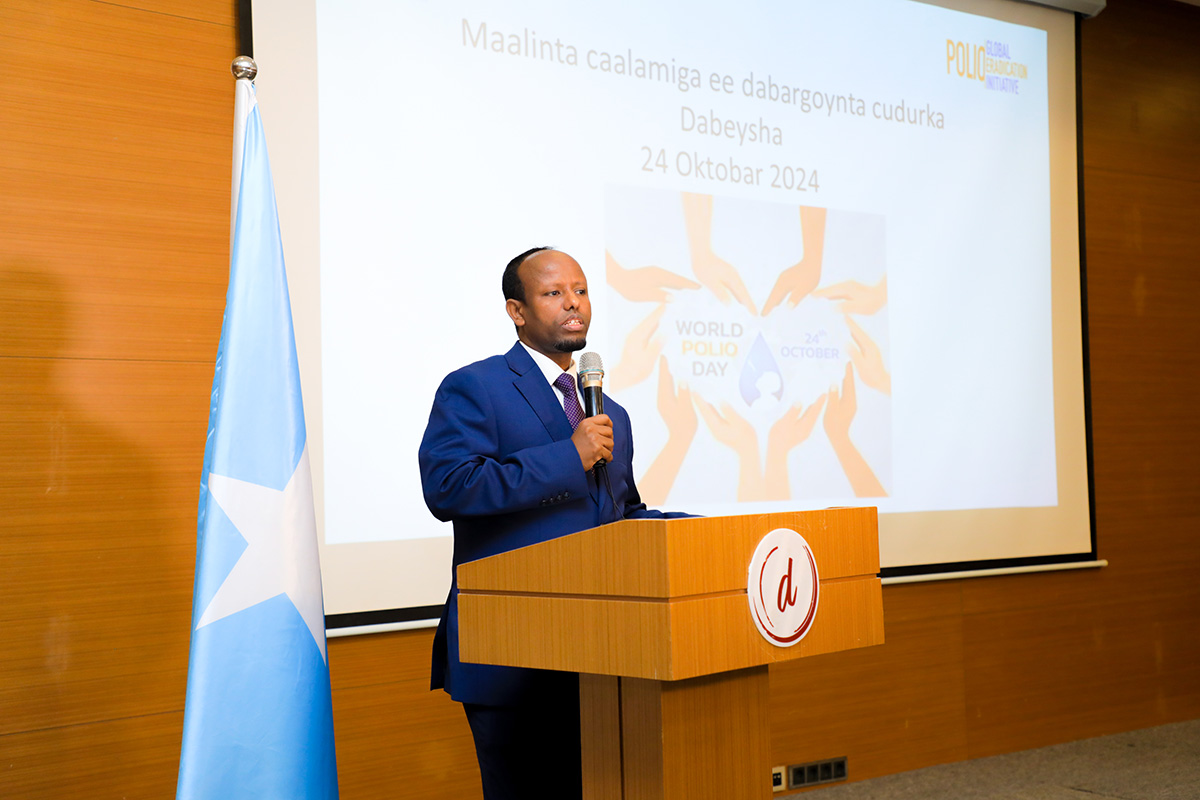
Achieving and maintaining a polio-free world means every child will be safe from being paralyzed by the disease. Today, as we mark the profound success of immunization against polio, we also call on all stakeholders to fund and prioritize vaccines in 2024.
Somalia successfully stopped transmission of wild poliovirus in 2014. However, the country is now facing the world’s longest running outbreak of circulating variant poliovirus type 2. Somalia is also facing recurrent outbreaks of measles and cholera spurred by drought and floods, underscoring the need for novel techniques to reach children in remote communities, expand vaccination coverage and enhance the health system.
“As we celebrate progress, we also recognize the critical work that remains. Incredible political commitment, demonstrated by the Prime Minister’s National Task Force on Immunization and Polio Eradication, along with the active involvement of ministers and state leaders in inaugurating polio campaigns, has been crucial in driving efforts to stop the current outbreak. Collaboration between the Somali government, health workers and international partners is paving the way towards a polio-free Somalia,” said the Minister of Health and Human Services of the Federal Government of Somalia Dr Ali Haji Adam.
"On this important day, we recognize the significant progress Somalia has made in the fight against polio through sustained immunization efforts, even in the country’s most remote regions, and strengthened surveillance systems that protect our gains. We remain committed to ensuring Somalia stays on track towards a polio-free future and will continue to provide support," said WHO Somalia Deputy Representative Dr Mohamed Ali Kamil.
Now is the time to end polio for good. But if we don’t stay committed the virus could quickly make a comeback. Somalia has been streamlining efforts to end transmission, using updated emergency action plans developed collectively by the Federal Ministry of Health and Human Services and GPEI partners.
"On this World Polio Day, we reflect on our journey and renew our commitment to reach every last child. With the tools at our disposal, we must intensify our efforts, innovate new strategies to reach those we’ve missed, and strengthen routine immunization," said UNICEF Deputy Country Representative for Somalia Nisar Syed. "No child should be paralyzed by or die from an illness that can be prevented through immunization. Investing in vaccines and a robust health system is a sure step to help protect future generations."
Immunization is one of humanity’s most remarkable success stories. In the last 50 years, immunization efforts have saved thousands of lives and helped significantly reduce infant deaths across the country. Together, we will work to secure a polio-free future for all Somali children.
For additional information, please contact:
Mohamed Osman, Federal Ministry of Health and Human Services, Head of Comms & Public Engagement,
Khadar Hared, WHO Communication Officer,
Lisa Hill, Communications Specialist, UNICEF,
26 years of building a solid foundation for polio eradication
Polio champion Maryan Jama Du’ale retires after 2.5 decades
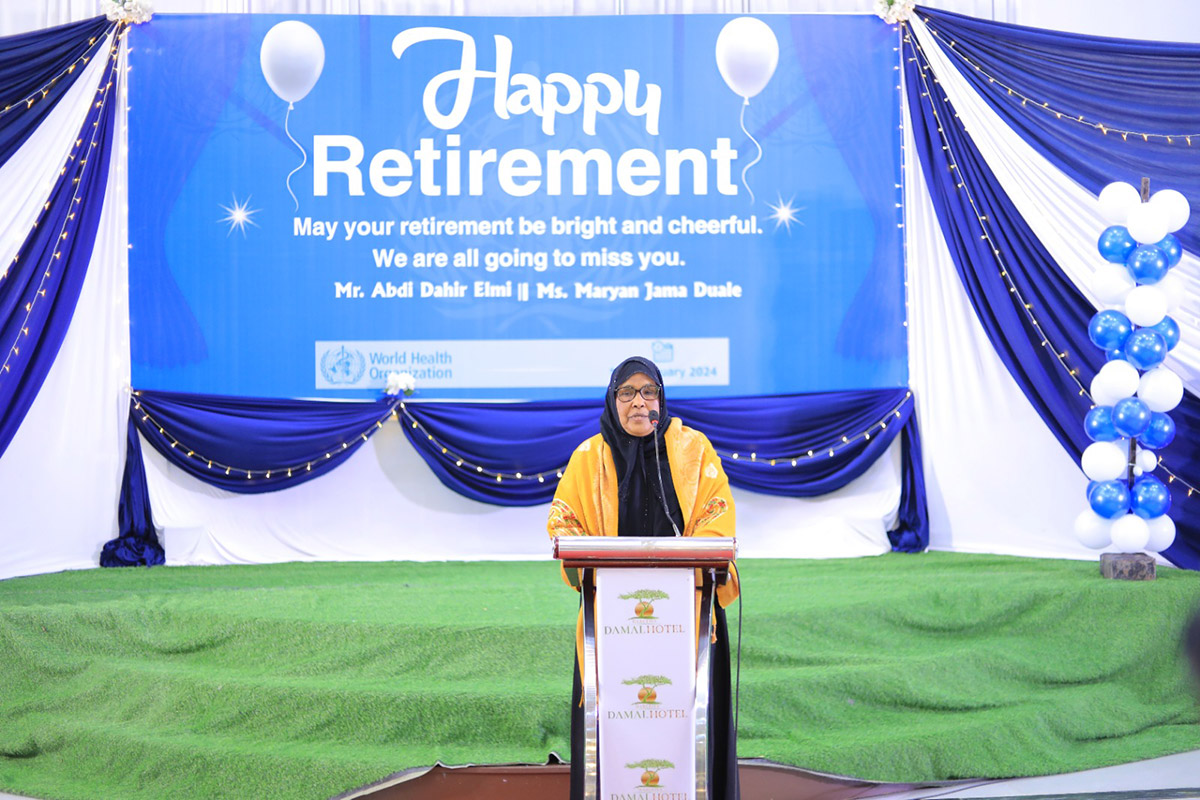 Maryam Jama Du’ale at her retirement farewell ceremony hosted by WHO Somalia in Hargeisa, Somaliland. Photo credit: WHO/WHO Somalia31 July 2024 – In April 1998, certified nurse and public health officer Maryan Jama Du’ale was invited to a workshop to get familiar with a new initiative: the National Polio Eradication Programme. She made an impression at the event, which was hosted by WHO and the health ministry of the self-declared administration of Somaliland. Within a few weeks, Maryan joined the programme as a district polio officer in Hargeisa, Somaliland.
Maryam Jama Du’ale at her retirement farewell ceremony hosted by WHO Somalia in Hargeisa, Somaliland. Photo credit: WHO/WHO Somalia31 July 2024 – In April 1998, certified nurse and public health officer Maryan Jama Du’ale was invited to a workshop to get familiar with a new initiative: the National Polio Eradication Programme. She made an impression at the event, which was hosted by WHO and the health ministry of the self-declared administration of Somaliland. Within a few weeks, Maryan joined the programme as a district polio officer in Hargeisa, Somaliland.
Her role included setting up surveillance sites to search for poliovirus in children aged under 15 years. She was also tasked with supporting the implementation of polio vaccination campaigns in Somaliland and supervising her teams to quickly address any setbacks.
When Maryan began her work, Somalia was engulfed in a civil war, its health infrastructure was in ruins and vaccine-preventable diseases, such as polio, were rampant. Back then, many people in the country did not know that polio existed – even though Somalia confirmed 12 wild poliovirus (WPV) cases in 1998.
Like many other communities around the world, many people in Somalia were afraid of vaccination. Limited awareness of polio-related activities also meant that some were initially sceptical about the need to collect stool samples from children presenting with acute flaccid paralysis (AFP), a common symptom of poliomyelitis.
“Community members thought vaccination would stop childbirth or that it was against our religion,” explains Maryan. “It took us a lot of time and effort to help people to understand that polio vaccines are safe and rigorously tested before use. Vaccine acceptance is much better now, although we face other challenges, such as complexities in reaching children in insecure areas. However, most people now understand that we collect stool samples from children with AFP to test for poliovirus.”
Inspired by a child to eradicate polio
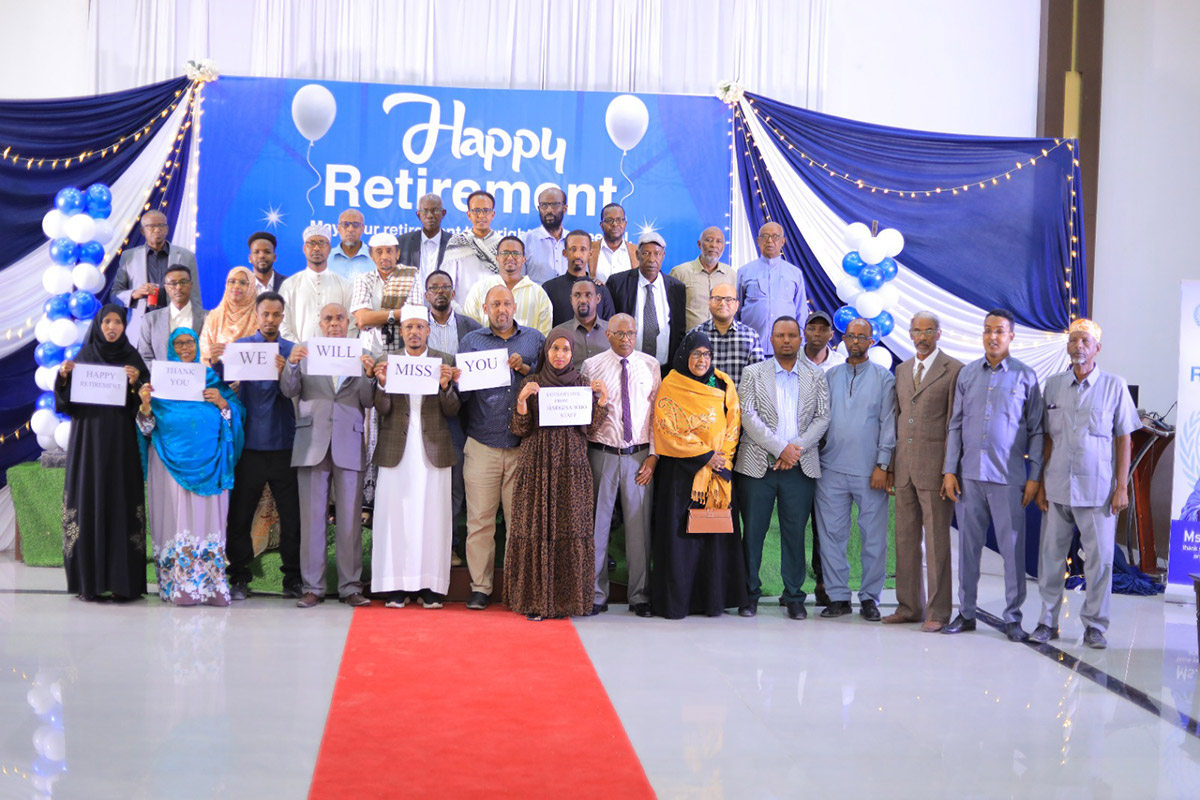 Group photo taken with retiree Maryan Jama Du’ale at her farewell ceremony. Photo credit: WHO/WHO SomaliaEarly on in her work, Maryan met a child who had been paralysed by WPV in the village of Qool-buulale, on the Somalia–Ethiopia border. It was a meeting that shaped the rest of her career.
Group photo taken with retiree Maryan Jama Du’ale at her farewell ceremony. Photo credit: WHO/WHO SomaliaEarly on in her work, Maryan met a child who had been paralysed by WPV in the village of Qool-buulale, on the Somalia–Ethiopia border. It was a meeting that shaped the rest of her career.
“That first encounter with a child paralysed by polio moved me. It made me understand the importance and impact of our work. I saw first-hand how our work could prevent further spread of polioviruses and protect children from lifelong paralysis,” she says.
The available health facilities, which were inadequate and far apart, could not address emerging cases and the need to provide vaccines.
“When we heard about polio cases, we often had to use donkey carts or camels to transport vaccines to reach remote villages or mountains. When a case was reported near the border, we would cross all kinds of terrain to reach children,” adds Maryan.
Over her career, Maryan and her teams helped ensure children received polio vaccinations and other health services. They did this with the help of dedicated medical doctors and trained health volunteers, and through social mobilization and outreach campaigns, among other strategies, backed by partners.
Owing to these immense efforts, the National Polio Eradication Programme made significant progress. Four years after the immunization programme was established, Somalia interrupted transmission of WPV, in 1998. Later, Somalia confirmed and closed a couple of imported WPV1 outbreaks, from 2005 to 2007 and from 2013 to 2014.
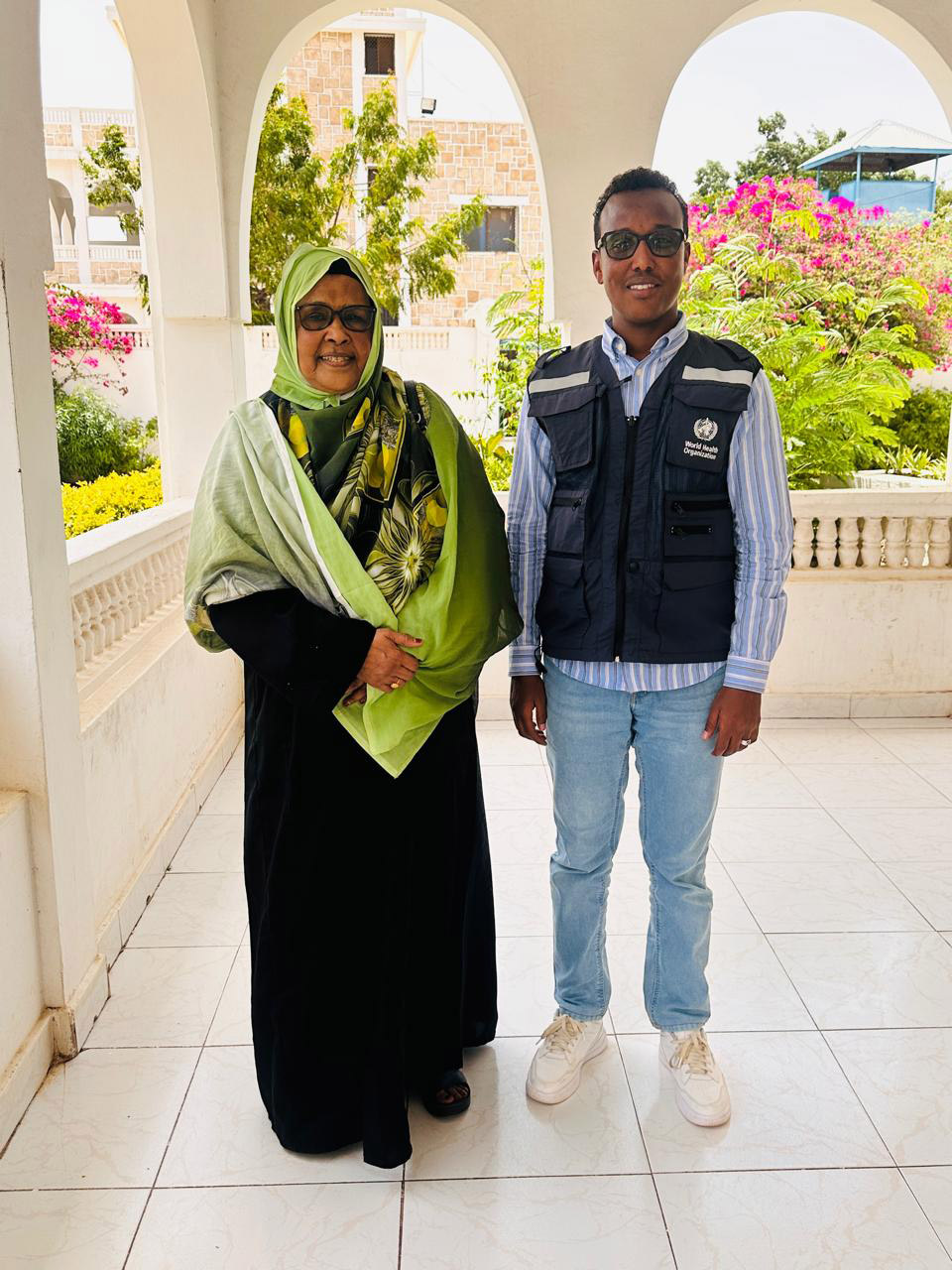 WHO Somalia Communication Officer Khadar Hared is pictured with Maryan Jama Du’ale after interviewing the polio champion about her experiences in Hargeisa. Photo credit: WHO/WHO SomaliaThe last time Maryan saw a child with WPV in Somaliland was in 2017 in Burco, Togdheer. In October 2017, however, Somalia confirmed an outbreak of variant poliovirus, which occurs in places where children have low immunity. Although Somalia has closed WPV and variant polio outbreaks before, the variant poliovirus that was detected in 2017 is still smouldering in the country. Maryan firmly believes Somalia will end this outbreak soon too.
WHO Somalia Communication Officer Khadar Hared is pictured with Maryan Jama Du’ale after interviewing the polio champion about her experiences in Hargeisa. Photo credit: WHO/WHO SomaliaThe last time Maryan saw a child with WPV in Somaliland was in 2017 in Burco, Togdheer. In October 2017, however, Somalia confirmed an outbreak of variant poliovirus, which occurs in places where children have low immunity. Although Somalia has closed WPV and variant polio outbreaks before, the variant poliovirus that was detected in 2017 is still smouldering in the country. Maryan firmly believes Somalia will end this outbreak soon too.
“Witnessing that our collective efforts, alongside the government and partners, had contributed to stopping poliovirus spread, time and again, continuously filled me with immense pride and happiness,” adds Maryan.
Passing on the baton after 26 years of service
Gradually, by earning communities’ trust and working to expand the programme over the years, Maryan rose through the ranks to become a state polio eradication officer. In this role, she managed eradication efforts across Somaliland. She retired in January 2024, after 26 years of exemplary service.
Maryan’s story reveals the power of resilience and the unwavering commitment of the health workforce to end polio in Somalia, even amid great adversity.
USAID supports set up of subnational Health Cluster structure in Somalia, boosting localization
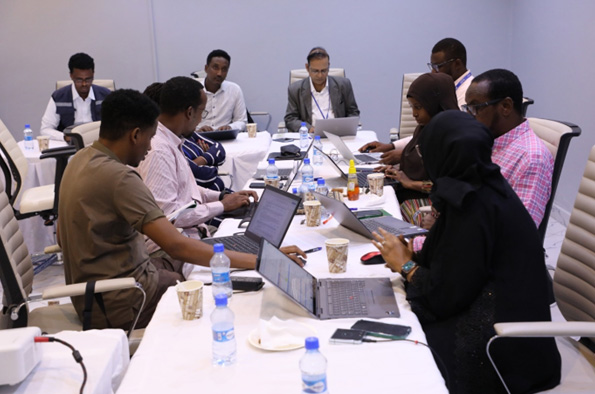 Dr Uday Raj Naidu Canchi Bhoopal (pictured in the middle), a WHO subnational Health Cluster coordinator, joins the Health Cluster strategic advisory group in a humanitarian fund allocation review exercise for partners in Jubaland. Photo credit: WHO/WHO Somalia3 July 2024, Mogadishu, Somalia – Ms Fatima Abdirazak Ahmed joined WHO in Somalia at the beginning of 2024 as a subnational Health Cluster coordinator in Hirshabelle state. Having just finished a meeting with 15 Health Cluster partners, she heads to the office of Hirshabelle State Ministry of Health. Here, she will brief and discuss with the Director-General the ongoing efforts of the Health Cluster to reach vulnerable and underserved communities with health services during the measles and cholera outbreaks across the state. Health Cluster partners thus play a crucial role in the collection and reporting of disease surveillance data.
Dr Uday Raj Naidu Canchi Bhoopal (pictured in the middle), a WHO subnational Health Cluster coordinator, joins the Health Cluster strategic advisory group in a humanitarian fund allocation review exercise for partners in Jubaland. Photo credit: WHO/WHO Somalia3 July 2024, Mogadishu, Somalia – Ms Fatima Abdirazak Ahmed joined WHO in Somalia at the beginning of 2024 as a subnational Health Cluster coordinator in Hirshabelle state. Having just finished a meeting with 15 Health Cluster partners, she heads to the office of Hirshabelle State Ministry of Health. Here, she will brief and discuss with the Director-General the ongoing efforts of the Health Cluster to reach vulnerable and underserved communities with health services during the measles and cholera outbreaks across the state. Health Cluster partners thus play a crucial role in the collection and reporting of disease surveillance data.
Dr Uday Raj Naidu Canchi Bhoopal is a subnational Health Cluster coordinator based in Kismayo, Jubaland. He leads regular Health Cluster meetings to coordinate partners’ actions on humanitarian response, from provision of supplies to service delivery, particularly for measles and cholera outbreak response. He also coordinates critical training for Health Cluster partners. Recently, he facilitated training for 12 health professionals, from various health facilities, on clinical management of severe acute malnutrition with medical complications, and cholera case management. The latter gave health workers the knowledge and practical skills to manage cholera cases appropriately and promote infection prevention and control in cholera treatment units in line with globally recognized practices and protocols.
Along with Fatima and Naidu, 5 more state-level Health Cluster coordinators are deployed across Somalia to ensure subnational coordination among partners and with state ministries of health. These subnational Health Cluster coordinators play a pivotal role in emergency response – for example, understanding demand and coordinating the provision of essential supplies – and in health system strengthening. For instance, they promote the use of the Somalia Essential Package of Health Services (EPHS) as a harmonized standard for health service delivery and outbreak response efforts.
Importantly, the Health Cluster coordinators also work with the other clusters, including the Food Security, Nutrition, WASH (Water, Sanitation and Hygiene) and Protection clusters. This coordination enables integrated responses to people in need of humanitarian assistance.
In Somalia, the Health Cluster comprises 81 partners: 28 international non-governmental organizations (NGOs), 42 national NGOs, 4 United Nations agencies, 3 donors, 3 observers and a single national authority. It is co-led by WHO and Save the Children.
Initially, only the national-level Health Cluster Coordination structure was in place. WHO was able to recruit 7 subnational Health Cluster coordinators (4 international and 3 national staff) thanks to funding support from the United States Agency for International Development (USAID) Bureau for Humanitarian Assistance (BHA). Having a well-functioning subnational Health Cluster structure supports operational coordination much closer to the affected population and better adapted to its specific needs, enabling true localization.
Since the subnational Health Cluster coordinators were deployed, the regular Health Cluster coordination meetings have fostered stronger coordination and collaboration among health actors. The impact of the new coordinators’ efforts was showcased at a recent meeting of the Somalia Health Partner Group (SHPG). At the meeting, Erna van Goor, National Health Cluster Coordinator, based in Mogadishu, presented to the donors and partners illustrative maps produced and monitored by the Health Cluster. These maps show the locations and functionality of health facilities and current availability of health services across the country. This presentation vividly demonstrated the complexities and triumphs of the work of the Health Cluster and its coordinators, which was highly valued by humanitarian and development actors for their essential role in preventing duplication of efforts, monitoring service availability and quality, and addressing the health needs of the most vulnerable populations.
For more information, please contact
Erna van Goor, National Health Cluster Coordinator, WHO Somalia
Email:
Madinur Saydahmat, Partnerships Officer, WHO Somalia
Email:








